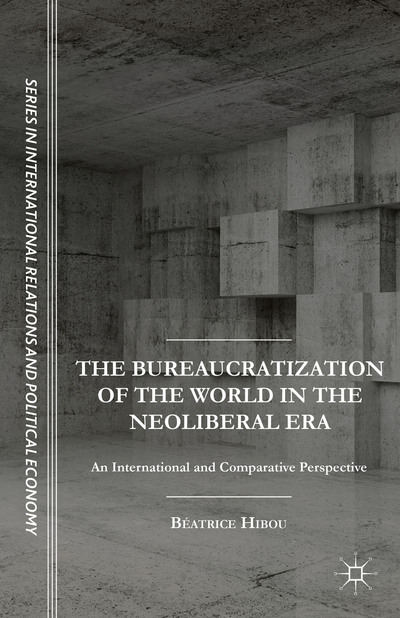Politics in the Interest of Capital

 Amsterdam Stock Market
Amsterdam Stock Market
Politics in the Interest of Capital
a MaxPo Discussion Paper Series, by Cornelia Woll
Abstract
The rise in inequality has been explained with reference to organized groups and the lobbying of the financial sector. This article argues that the image of politics as organized combat is contradicted by empirical evidence on lobbying in the United States, and does not travel well to Europe. The power of finance does not operate through organized political influence. Rather, politics in the interest of capital unfolds as a struc tural feature of advanced economies over time. Tellingly, at the height of the financial crisis, one of the most promising strategies of institutions seeking government support was not organizing for combat, but collective inaction. Our challenge, then, is to explain how the power of finance has built up and is playing out in creating inequality. A more
structural, less agency-focused perspective highlights how the rise of finance has been
supported by actors that few would accuse of being finance-friendly, such as the European center-left parties and consumers. Reconceptualizing the power of finance has important implications for political solutions to rising inequality.
-----
Cornelia Woll, Professor of Political Science, recently named Vice President for Studies and Academic Affairs of Sciences Po, focuses her research on international and comparative political economy. In particular she investigates regulatory issues in the European Union and the United States and the transformation of State capacity in financialized economies and the inequalities that result from this transformation. More
QS 2015: Sciences Po maintains its status as a university of excellence

 QS World University Rankings
QS World University Rankings

In the QS 2015 ranking by discipline, Sciences Po maintains its status as a university of excellence at national level: 1st in Political Science & International Relations, 2nd in Law and Sociology, 3rd in Economics, 4th in History.
Internationally, Sciences Po mouving up 8 places in Political Science & International Relations to reach the 5th place and joins the top 10.
For other disciplines, there is a slight decline compared with the ranks achieved in 2014. However, at the same time, intermediate indicators - impact research, citations, academic reputation and reputation with employers - are progressing positively.
According to QS, the discrepancy between indicators and ranking is due to the doubling of the number of ranked universities and the development of the methodology, including the incorporation of new specialties. Sciences Po is so for the first time classified "Development Studies", ranking second in France on this subject.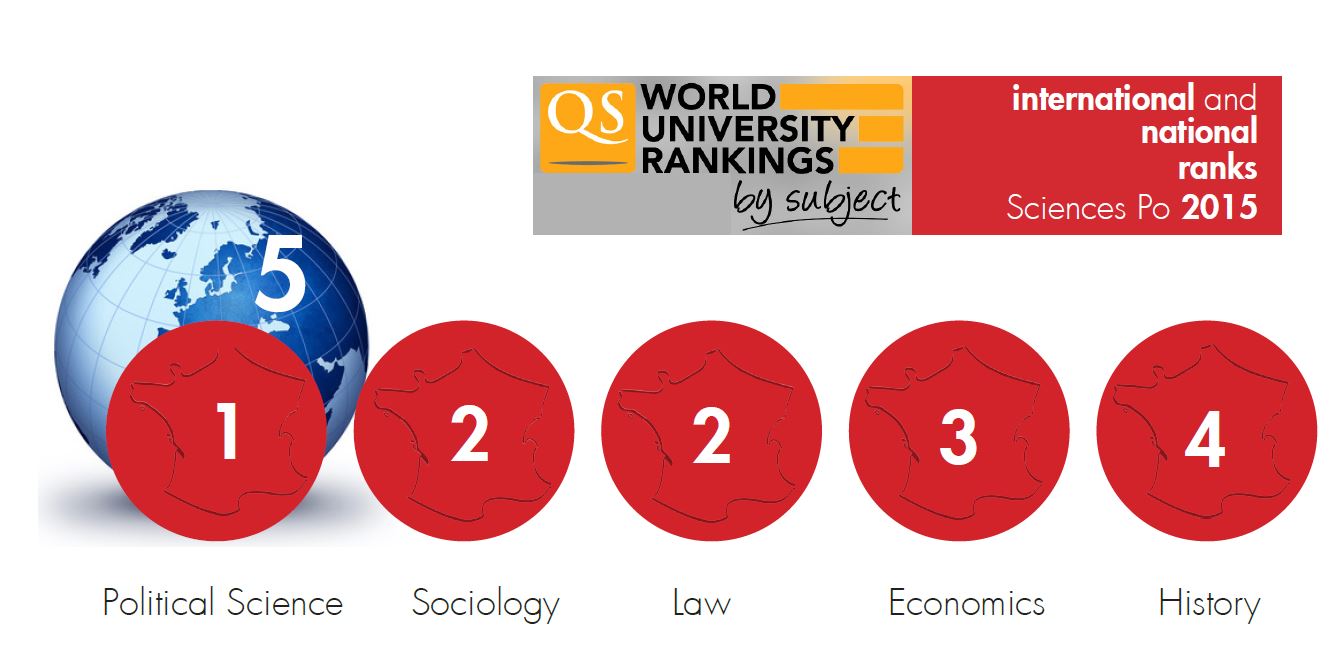
From Deep State to Islamic State
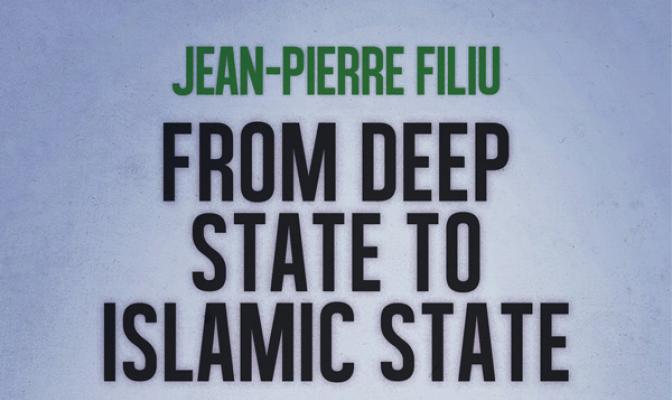
 From Deep State to Islamic State.The Arab Counter-Revolution and its Jihadi Lega
From Deep State to Islamic State.The Arab Counter-Revolution and its Jihadi Lega
Hurst Publishers, 2014
In his disturbing and timely political history of the ‘Deep State’ in the Middle East, Jean-Pierre Filiu reveals how the autocracies of Syria, Egypt, and Yemen crushed the democratic uprisings of the ‘Arab Revolution’. They did so by turning to the shadowy intelligence agencies and internal security arms of the so-called ‘Deep State’ — emulating strategies pioneered in Kemalist Turkey — who had decades of experience in dealing with internal dissent, as well as to street gangs (the Baltaguiyya in Egypt) or death squads (the Shabbiha in Syria) to enforce their will.
Alongside intimidation, imprisonment and murder, the Arab counter-revolutionaries released from prison and secretly armed and funded many hardline Islamists, thereby boosting Salafi–Jihadi groups such as Islamic State, in the hope of convincing the Western powers to back their dictatorships. They also succeeded in dividing the opposition forces ranged against them, going so far as to ruthlessly discard politicians and generals from among their own elite in the pursuit of absolute, unfettered, power.
The impact of the Arab counter-revolution surprised most observers, who thought they had seen it all from the despots and security mafias of the Middle East: their perversity, their brutality, their voracity. But the wider world underestimated their ferocious readiness to literally burn down their countries in order to cling to absolute power. Bashar al-Assad clambered to the top of this murderous class of tyrants, driving nearly half of the Syrian population into exile and executing tens of thousands of his opponents. He has set a grisly precedent, one that other Arab autocrats may yet resort to.
Reviews
‘It takes patience, clarity and perspective to explain the whole grim picture [in the Middle East] and the links between its constituent parts. These qualities are on impressive display in an important new book by the French scholar Jean-Pierre Filiu. His particular skill is to describe the development, survival and resurgence of the Arab “deep state,” the security agencies that have kept it going and the “monster they helped create” – in its most extreme form the jihadis of the Islamic state (Isis). … The answer, Filiu concludes bravely, has to be more democracy, not less, not a fatalistic acceptance that change can never come to the Middle East.’ — The Guardian
‘Far and away the best and most up-to-date survey of the Arab Security State and its ability to master the various waves of popular uprisings it faced during the Arab Spring. Based on a set of challenging hypotheses as well as an unrivalled feel for Arab political behaviour it must become required reading.’ — Roger Owen, Emeritus Professor of Middle East History, Harvard University
Understanding Musical Diplomacies

 Rembrandt, The Music Party, Rijlsmuseum Amsterdam. Common domain
Rembrandt, The Music Party, Rijlsmuseum Amsterdam. Common domain
Sounds and Voices on the International Stage : Understanding Musical Diplomacies
International Conference organized by CERI Sciences Po, CERLIS - Sorbonne Nouvelle-Paris 3-CNRS-Paris Descartes.
20/21 APRIL 2016
CALL FOR PROPOSALS
In international relations, music and diplomacy are strongly interrelated. Diplomats have gathered for musical events and musicians served as representatives. Whatever political unit is under consideration (city-states, empires, nation-states), music is a component of diplomacy, its ceremonies, and its strategies. There is a new interest for this dimension of international reality in History (Flechet & Marès, Gienow-Hecht), Musicology (Ahrendt et al, Fosler-Lussier), and International Relations (Dillon, Bleiker, Street) – beyond the aesthetic and cultural turns that marked these disciplines.
The main aim of this conference is to contribute to the debate by fostering a comparative approach (across time, cultures, arts, and polities) to the following themes:
- Change in diplomatic practices relating to music. Can we identify turning points concerning the designs and the uses of music as a diplomatic resource by states? Does the training of diplomats still relies on an awareness of musical practices?
- The uses of music in non-governmental diplomacies. Does multi-track diplomacy integrate a musical component and what are its effects on international interactions?
- The specificity of musical diplomacy. Does musical diplomacy differ from other types of cultural diplomacy (museums, ballets, theatres)?
- The goals of musical diplomacies. Does cooperation in the field of music present specific attributes that make it more effective to foster multilateral rather than bilateral negotiations, for example?
All these issues are part of a commitment to the renewal of diplomatic studies around a reading of the sensible and the role of symbols (Neumann, 2012). They are also in resonance with the idea of plural diplomacy (Cornago, 2013).
Proposals (200 words maximum) should be sent to musicaldiplomacies@gmail.com before September 20th, 2015.
Scientific committee: Christian Lequesne (CERI Sciences Po), Cécile Prévost-Thomas (CERLIS Sorbonne Nouvelle-Paris 3-CNRS-Paris Descartes), Frédéric Ramel (CERI Sciences Po)
Joan Moras awarded

 Joan Monras, Sciences Po
Joan Monras, Sciences Po
Congratutlations to Dr Joan Monras, winner of the Young Labour Economist Prize 2015, awarded by the European Association of Labour Economists (EALE) for his paper on Economic Shocks and Internal Migration.
This paper looks at the question how local negative demand shocks can be ameliorated by internal migrations. This question has been first addressed by Blanchard and Katz (1992). What makes this paper different from previous work is the finding that it is inflows rather than outflows that respond to regional demand shocks.
The paper illustrates that net in-migration rates decreased in areas more affected by the Great Recession and comes to the important conclusion that internal migration might help to alleviate up to one third of the effects of the crisis on wages in the most affected locations. What is really interesting is that this effect is due to a decrease in in-migration into locations affected by negative shocks rather than an increase in out-migration.
The paper not only provides a carefully explained identification strategy, but also structures the empirical analysis along a model of internal migration.
It addresses a very important issue and does so in a highly original and convincing way
The 22nd International Conference of Europeanists
-
22nd International Conference of Europeanists from Sciences Po on Vimeo.

 Eric Fischer - European detail map of Flickr and Twitter locations
Eric Fischer - European detail map of Flickr and Twitter locations
The Council for European Studies (CES) is an institution that was founded in 1970 and gathers Europeanists from five continents. Based in New York, its mission is to promote research on Europe in the humanities and social sciences. Every year the CES organizes an international conference in partnership with a prestigious university. This year, Sciences Po has the honor of hosting the 22nd conference in July 2015 on the future of Europe: “Contradictions: Envisioning European Futures”. Over 300 sessions are planned over 3 days, bringing together 1,500 participants.
This conference will allow members of the research community to present their work, to learn about research being conducted in the field, and especially to exchange ideas with peers and advance knowledge.
The Centre d’études européennes (UMR8259) is organizing the conference with the support of the Laboratoire Interdisciplinaire d’évaluation des politiques publiques (Labex, (ANR-11-LABX-0091 & ANR-11-IDEX-0005-02). Linda Amrani (chief administrator), Renaud Dehousse (university professor and Centre director), Patrick Le Galès (CNRS senior researcher) and Cornelia Woll (full professor) are members of the organizing committee, which is presided by Virginie Guiraudon (CNRS senior researcher). Jenny Andersson (CNRS researcher, CNRS bronze medal recipient in 2015) actively participated in the program’s development as Program co-chair.
Virginie Guiraudon, elected member of the CES executive committee, explains: “for young researchers, this is a unique socialization opportunity where their research will discussed by established researchers, and where they will meet authors of seminal and pioneering research in their field. For established academics it is an opportunity to present ongoing and completed projects, and to strengthen ties with researchers from all the HSS disciplines established in various countries. This conference enables coordination of multidisciplinary research agendas on major issues such as the political economy of Europe, the future of the welfare state and European integration, cultural diversity and gender studies”.
The Bureaucratization of the World in the Neoliberal Era

 Histogram of normal and no normal distribution
Histogram of normal and no normal distribution
The Bureaucratization of the World in the Neoliberal Era, An International and Comparative Perspective
by Béatrice Hibou
Palgrave Macmillan, May 2015
At the point where Max Weber meets Michel Foucault, Béatrice Hibou analyzes the political dynamics underlying a set of norms, rules, and procedures that form contemporary beurocracy. Neoliberal bureaucracy is a vector of discipline and control: even more, it produces social and political indifference.
Under the pretext of depoliticization, this trend cannot hide the exercise of normalizing and excluding power. Bureaucratization is not something external to society: it unfolds through the very same actors who are its target and who, consciously or not, play an essential role in this process. Operating as it does through individuals, bureaucratization does not come 'from above': it is a much wider process of 'bureaucratic participation', a response to the need to voice material and vested interests and give answers to legitimate demands, as well as expressing the quest for efficiency, but it also reflects day-to-day conflicts and negotiations between actors. In this way, bureaucratic participation is constructed through power relations, and paradoxically relies on informalities that alone make the neoliberal art of government possible.
-----
Béatrice Hibou is a CNRS researcher at the Sciences Po Centre for International Studies - CERI. Based on political economy, her comparative research focuses on imperial fabrics, State formation, political orders, modes of domination, collective action and comparative historical sociology of the economy. She also dedicates a number of studies to political organisation in Africa.
She has published a number of books related to these issues : The Force of Obedience: the Political Economy of Repression in Tunisia (2011, Cambridge) ; Privatizing the State (2004, Hurst-Columbia University Press) ; The Criminalization of the State in Africa (co-ed., 1998, Bloomington-Indiana University Press)
From Deep State to Islamic State

 From Deep State to Islamic State.The Arab Counter-Revolution and its Jihadi Lega
From Deep State to Islamic State.The Arab Counter-Revolution and its Jihadi Lega
In his disturbing and timely political history of the ‘Deep State’ in the Middle East, Jean-Pierre Filiu reveals how the autocracies of Syria, Egypt, and Yemen crushed the democratic uprisings of the ‘Arab Revolution’. They did so by turning to the shadowy intelligence agencies and internal security arms of the so-called ‘Deep State’ — emulating strategies pioneered in Kemalist Turkey — who had decades of experience in dealing with internal dissent, as well as to street gangs (the Baltaguiyya in Egypt) or death squads (the Shabbiha in Syria) to enforce their will.
Alongside intimidation, imprisonment and murder, the Arab counter-revolutionaries released from prison and secretly armed and funded many hardline Islamists, thereby boosting Salafi–Jihadi groups such as Islamic State, in the hope of convincing the Western powers to back their dictatorships. They also succeeded in dividing the opposition forces ranged against them, going so far as to ruthlessly discard politicians and generals from among their own elite in the pursuit of absolute, unfettered, power.
The impact of the Arab counter-revolution surprised most observers, who thought they had seen it all from the despots and security mafias of the Middle East: their perversity, their brutality, their voracity. But the wider world underestimated their ferocious readiness to literally burn down their countries in order to cling to absolute power. Bashar al-Assad clambered to the top of this murderous class of tyrants, driving nearly half of the Syrian population into exile and executing tens of thousands of his opponents. He has set a grisly precedent, one that other Arab autocrats may yet resort to.
Some reviews
‘An authoritative and revealing tour of the role of “Arab security mafias” in shaping the politics of the Middle East. Filiu’s account of the failure of the Arab uprisings places the blame for the region’s chaos where it belongs: with the reconstituted deep states, security agencies and autocratic leaders determined to hold on to power at any cost.’ — Marc Lynch, Director of the Institute for Middle East Studies at George Washington University
Far and away the best and most up-to-date survey of the Arab Security State and its ability to master the various waves of popular uprisings it faced during the Arab Spring. Based on a set of challenging hypotheses as well as an unrivalled feel for Arab political behaviour it must become required reading.’ — Roger Owen, Emeritus Professor of Middle East History, Harvard University
Fertility Policies and Social Security Reforms in China

 Fertility Policies and Social Security Reforms in China
Fertility Policies and Social Security Reforms in China
This paper analyzes the impact of relaxing fertility controls and expanding social security in China. We develop an overlapping generations model in which fertility decisions and capital accumulation are endogenously determined in the presence of social security. In our model, children are an alternative savings technology—as they transfer resources to their retired parents. Important feedback links arise between fertility and social security variables: an expansion of social security benefits reduces fertility—partially offsetting the effects of relaxing the one-child policy. The feedback loop between social security variables and fertility suggests that abandoning fertility restrictions may not be as effective in helping to finance China’s intended pension reform, especially if children are an important source of old-age support. The sustainability of the pension system is particularly at risk in the event of a growth slowdown. The objective of pension reforms may also be incongruent with other reforms, such as financial liberalization and financial integration.
Nicolas Coeurdacier is Associate Professor at the Sciences Po Departement of Economics
Stéphane Guibaud is Assistant Professor of Finance at the Sciences Po Departement of Economics
Keyu Jin is Assistant Professor at the LSE Centre for Macroeconomics
Welcome to Visiting Faculty

 Visiting Faculty at Sciences Po
Visiting Faculty at Sciences Po
Mobile Europe
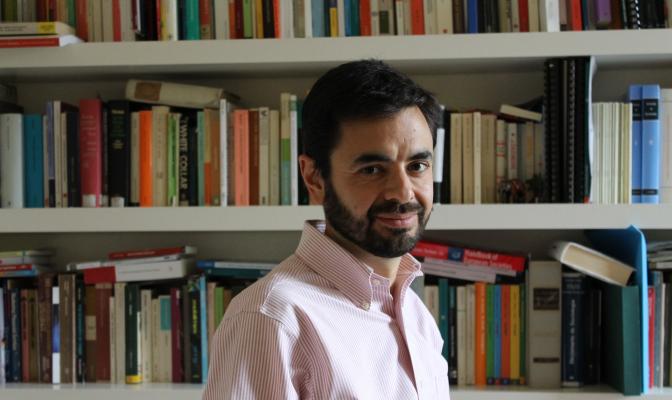
 Ettore Recchi
Ettore Recchi
A just published book “Mobile Europe” written by Ettore Recchi, Professor of Sociology at OSC, presents analyses* about its main research interests: mobilities and European integration. They may help to reboot European integration.
Once upon a time, Europeans migrated – now, they move. Visas, passports, and a plethora of other authorizations are long gone for people willing to cross borders within the EU. European integration has paved the way to a supranational area in which the power of the state to control individuals’ choices of travel and settlement has been curbed, creating a sort of natural experiment of a borderless world region. The EU has thus established the market-embedded political infrastructure of a unique ‘human mobility system’ – the European free movement regime. By virtue of it, EU citizens enjoy a unique right to freely move across 28 different sovereign countries. In spite of the proliferation of international agreements and alliances in different regions of the globe, nothing as such exists elsewhere. The individual freedom of cross-border mobility distinguishes the EU from other merely neo-liberal international integration projects like NAFTA. Historically, this is a most unusual and forward-looking achievement that is today overlooked at a time of widespread pessimism on the future of the EU.
Mobile Europe first outlines the historical premises and the political-economic rationales of this regime, and then delves into its effects on individuals’ lives. Demographically, free movement has gained ground over time, especially with the EU enlargements of the 2000s. In part, EU movers supplant third country nationals as a reservoir of migrant workforce. However, there is more to it. Free movement underpins a huge diversity of mobility projects which do not fit traditional migration patterns. It also works as a political umbrella to the broadening ‘social appetite’ for spatial mobility. All over the world, the number of people crossing nation-state frontiers – whatever the reason, from labour migration to all sorts of tourism – has exponentially increased in the last decades. A major socio-political puzzle is how this expansion of international mobility experiences feeds back on citizenship practices and sense of belonging. On the basis of original data collected since the early 2000s, the author concludes that intra-EU movements do nurture an enhanced cosmopolitan sensitivity but, in fact, are not sufficient by themselves to generate a critical mass of EU-oriented political participation. Nonetheless, EU movers form a potentially strategic population in view of the re-booting of European integration inspired more by a common political vision than market-driven dynamics.
* The exploited data have mainly been elaborated in the framework of three international research projects on mobility in Europe funded by the European Commission : Pioneur, Moveact, Eucross.
Additional resources
"Globalised Minds, Roots in the City: Urban Upper-middle Classes in Europe" by Alberta Andreotti, Patrick Le Galès, Francisco Javier Moreno-Fuentes, January 2015, Wiley-Blackwell
Sergei Guriev

 Sergei Guriev
Sergei Guriev
Sergei Guriev, who joined the Department of Economics as Full Professor this past Fall, will be taking the helm of the International Society for New Institutional Economics (ISNIE) in 2016.
ISNIE is "an interdisciplinary enterprise combining economics, law, organization theory, political science, sociology and anthropology to understand the institutions of social, political and commercial life... but its primary language is economics. Its goal is to explain what institutions are, how they arise, what purposes they serve, how they change and how - if at all – they should be reformed."
Among his duties, Sergei GURIEV will be in charge of organising ISNIE's Annual Conference in 2016 at Sciences Po - after Harvard, and before Columbia - with the support of the Department and LIEPP.
Warmest congratulations!
March 2015
Elites, Privilege and Excellence
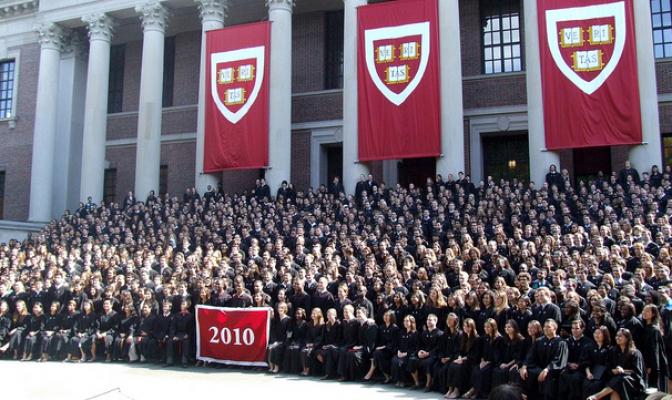
 Harvard college graduates (Photo Zilinsky CC-BY-ND-2.0)
Harvard college graduates (Photo Zilinsky CC-BY-ND-2.0)
Elites, Privilege and Excellence : The National and Global Redefinition of Educational Advantage
Routledge - World Yearbook of Education 2015 Series - February 2015
Edited by : Agnès van Zanten (Sciences Po, OSC), Stephen Ball (Institute of Education, University of London),
& Brigitte Darchy-Koechlin (Department of Research Development, French Ministry of Higher Education and Research)
This book focuses on educational elites and inequality, particularly on the ways in which established and emergent groups located at the top of the social hierarchy and power structure reproduce, establish or redefine their position.
The volume is organized around three main issues:
- analyzing the way in which parents, students and graduates in positions of social advantage use their assets and capitals in relation to educational strategies, and how these are different for old and new and cultural and economic elites;
- studying how elite institutions have adapted their strategies to take into account changes in the social structure, in policy and in their institutional environment and exploring the impact of these strategies on educational systems at the national and global levels;
- mapping the new global dynamics in elite education and how new forms of 'international education' and 'transnational cultural capital' as well as new global educational elite pathways shape elite students’ identities, status and trajectories.
Making use of a social and an institutional approach as well as a focus on practices and policies, the volume draws on research conducted on secondary schools and on higher education.
In addition, the global contributions within the book allow for a comparison and contrast of situations in different countries. This results in a comprehensive picture of common processes and national differences concerning advantage and excellence and a thorough examination of the impact of globalization on the strategies, identities and trajectories of elite groups and individuals alongside more general cultural and economic processes.
Former colonial powers
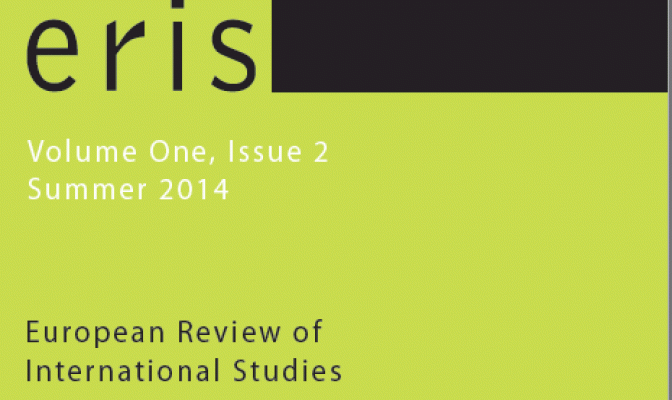
 European Review of International Studies
European Review of International Studies
The last issue of the European Review of International Studies - a journal issued with the participation of the CERI - is dedicated to former colonial powers and the management of political crises in their former colonies
Table of contents
- Introduction: Far Away and yet so close. Former colonial Powers and the management of political crises in their former colonies
- Élise Féron, Valérie Rosoux - The Two Faces of Belgium in the Congo: Perpetrator and Rescuer
- Valérie Rosoux - Portugal and East Timor: Managing Distance and Proximity in Post-Colonial Relations
- Teresa Almeida Cravo, Maria Raquel Freire - France’s Intervention Policy in Africa Seen from Below: Some Thoughts on the Case of Côte d’Ivoire
- Richard Banégas - The Algerian Civil War, Reminiscences of the Colonial Enemy
- Laetitia Bucaille - Prisoners of History? British-Irish Relations and the Conflict in Northern Ireland
- Élise Féron - Post-Soviet or Post-Colonial? The relations between Russia and Georgia after 1991
The European Review of International Studies (ERIS) is a journal to which those who wish to know what is happening in ‘European’ International Relations can turn. It aims to achieve this goal by an extensive review section of monographs published in European languages and review articles of the literature on substantive themes or significant developments in different European academic communities. Its other principal goal is to publish original articles and from time to time translations of existing major articles not readily available in English.
Jenny Andersson awarded

 Jenny Andersson
Jenny Andersson
Jenny Andersson, a CNRS fellow and researcher at the Centre d’études européennes at Sciences Po, has been awarded the prestigious CNRS* Bronze Medal for her research.
CNRS Bronze Medal rewards the first work of a researcher, which makes him/her a talented specialist in his field. This award represents a CNRS encouragement to pursue well on track and already produced fruitful results.
Besides, Jenny Andersson, economic historian, is the principal investigator of the Futurepol project, funded by the European Research Council. The Futurepol project "Knowledge production and future governance in the post war period " aims to make a political history of the future.
In addition, Jenny Andersson continues to work on her core research interests ie. the history of social democracy and the political economy of the Welfare State.
February 2015
* CNRS : The "Centre National de la Recherche Scientifique" is the French National Center for Scientific Research
A diverging Europe on the edge
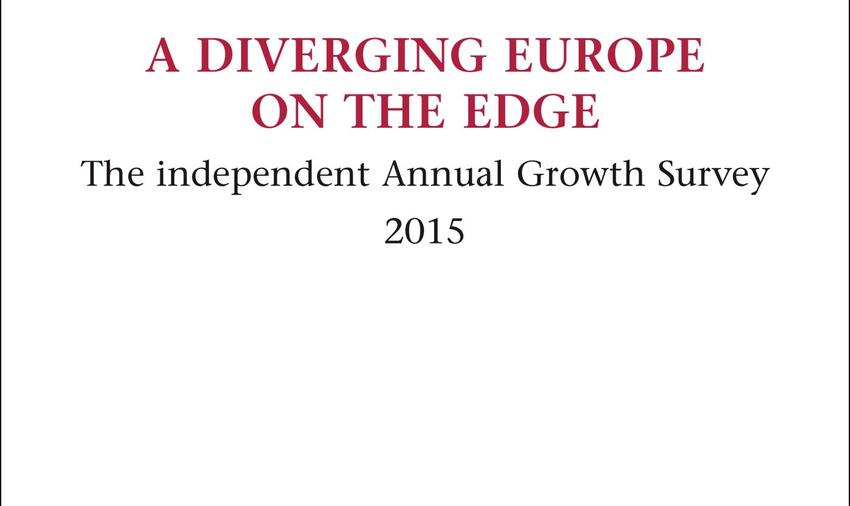
 e third independent Annual Growth Survey
e third independent Annual Growth Survey
This is the third independent Annual Growth Survey (iAGS), each a response to the European Commission's AGS, and we have to take note sadly of the continuation of the crisis. Response to the euro sovereign debt crisis has been substantial, but we analyse that it was not sufficient to give a strong enough momentum to the euro area economy in order lastingly to exit the recession it entered 6 years ago.
Failing to exit the crisis brings many poisons, economic, social, and political. Unemployment is at high levels, inequality is rising, and convergence between European regions that was once the rule is no longer occurring. Pressure on wages and the need to restore internal balances between countries fuels deflation. Debt deleveraging, private or public, is far from accomplished and the prospect of falling prices may be the mechanism by which stagnation is perpetuated.
The European project of a prosperous and inclusive society is going to sink if we fail to rebound.
Monetary policy alone can't solve the problem. Fiscal policy coordination still does not work well and its bias toward front loading has to be corrected. In the opinion of the authors, what is needed is to circumvent the rules of the fiscal compact. The Juncker plan is one attempt to do so, by proposing to exclude Member State's contribution from national deficit and debt rules. That is far from sufficient, but it opens the way to find ways to achieve fiscal stimulus while continuing to exert pressure on national public finance. Structural reforms cannot be used as a substitute for a stimulus and the possible short term impact on prices or activity should be considered with extreme care.
Koen Jochmans awarded

 Koen Jochmans awarded
Koen Jochmans awarded
The Royal Economic Society and The Econometrics Journal announced January 19th, 2015 that the 2013 Denis Sargan Econometrics Prize is awarded to the Department's Koen Jochmans.
The Denis Sargan Econometrics Prize is awarded to the best article published in The Econometrics Journal in a given year by a researcher who is within five years of being awarded their doctorate.
Koen Jochman won the prize for his paper Pairwise-comparison estimation with non-parametric controls published in The Econometrics Journal, Vol. 16, Issue No. 3, pp. 340-372.
Congratulations!
More about Koen Jochmans and his research
Interview: Emanuele Ferragina

 Emanuele Ferragina
Emanuele Ferragina
Emanuele Ferragina joined Sciences po in January 2015 as an Assistant Professor at the Observatoire sociologique du changement (OSC) and the Laboratory for Interdisciplinary Evaluation of Public Policies (LIEPP).
We gave him an interview. Read the article.
16 new academics at Sciences Po

 La communauté académique s'agrandit
La communauté académique s'agrandit
Sciences Po recruited 16 researchers and professors during the 2013-2014 academic year, in four of the major social science disciplines taught at Sciences Po: economy, law, sociology and political science.
Graduates of Harvard, the London School of Economics, or the Université Pierre et Marie Curie; specialists in the economics of migration, intellectual property, public violence or the politics of risk.
Discover the diverse backgrounds of these new recruits.
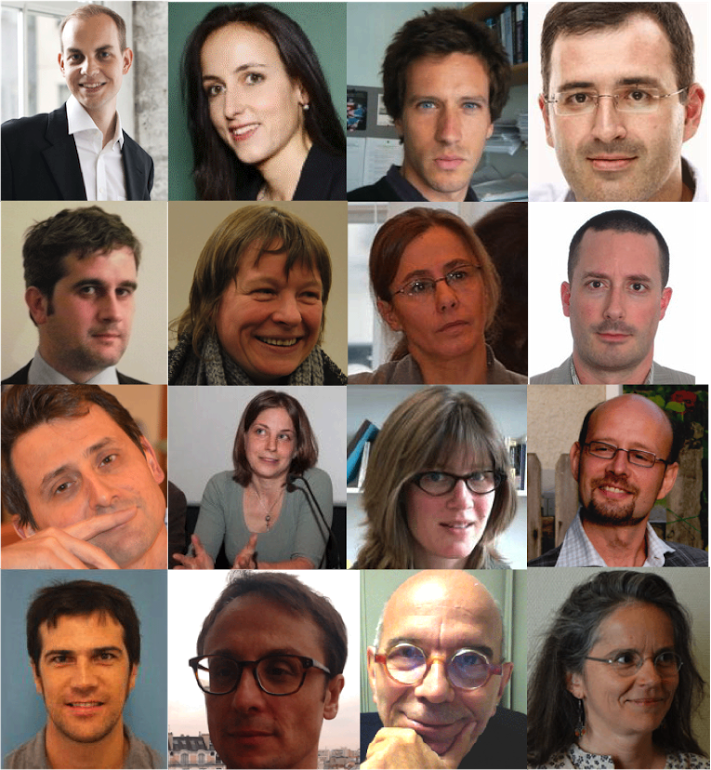
Sciences Po-Columbia

 Sciences Po-Columbia Joint Research Projects
Sciences Po-Columbia Joint Research Projects
Three research and teaching projects designed by researchers at Sciences Po and Columbia were awarded by the Alliance programme for their innovative approaches.
The three projects are entitled "Ethno-religious Identity and Politics in the Middle East and South Asia", "Social Sciences and the Danger of Literature", "A Cultural History of Knowledge and The Territories of the Economy, Rescaling, Circulation".
Alliance is a programme supporting transatlantic cooperation between Columbia, Sciences Po, the Ecole Polytechnique and Paris 1 Panthéon Sorbonne. Each year, Alliance recognises five to six exceptional projects. These projects of excellence are notably recognised for their original aspects: the partnering of rarely combined disciplines or the use of new pedagogical frameworks.
Two of Sciences Po's economists
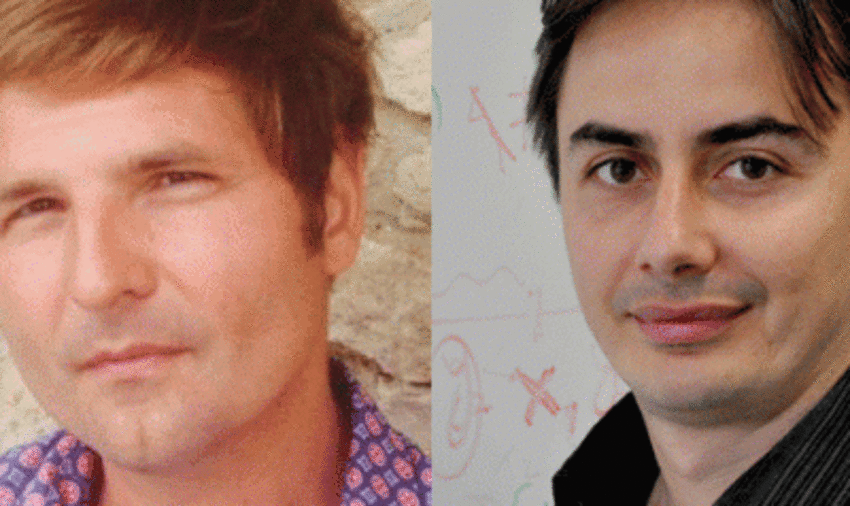
 Yann Algan, Émeric Henry
Yann Algan, Émeric Henry
The 2014 Deutsche Bahn Prize went to Yann Algan and Émeric Henry - both researchers at Sciences Po's Departement of Economics - and to their co-authors Yochai Benckler and Jerome Hergeux (Harvard).
Each year, the Deutsche Bahn Prize rewards CEPR Fellows for outstanding research in organisation and management.
The paper - Social Motives and the Organization of Production: Experimental Evidence from Open Source Software - analyzes the behaviour of 1,200 open source software (OSS) developers and uses the behaviour of the OSS developers in experimental trust, dictator, and public games to predict and explain the behavior of OSS developers in software projects.
The authors find that those developers with higher social motivation tend to participate in fewer projects, but cooperate more intensively. By highlighting the role of social motivation and self-selection of like-minded types into project teams, the paper contributes to the important question of how organizations that are lacking formal structure and hierarchies can solve problems of free-riding of their members.
More about Yann Algan and his research - More about Émeric Henry and his research
Three médialab researchers

 médialab de Sciences Po
médialab de Sciences Po
The British Journal of Sociology, a reference journal in sociology, recently awarded its annual prize to “The whole always smaller than its parts,” an article written by three médialab researchers - Bruno Latour, Dominique Boullier and Tommaso Venturini - in collaboration with two physicists from the ENS Lyon, Pablo Jensen and Sebastian Gauwin.
By using new digital tools developed in the médialab, it is possible to implement one of the most original ideas from Gabriel Tarde, a founder of sociology and Sciences Po’s first professor in this discipline. Tarde sought to challenge what had become the norm in the social sciences: the division between the individual and society. He wanted to trace out social connections without assuming the existence of individuals or of society, however due to the rudimentary statistical tools of the time this alternative was impossible. This is what the médialab’s BJS awarded article proves: it is possible to map out the social world differently, and this opens up new perspectives for both qualitative and quantitative approaches in the social sciences.
Chistophe Jaffrelot awarded
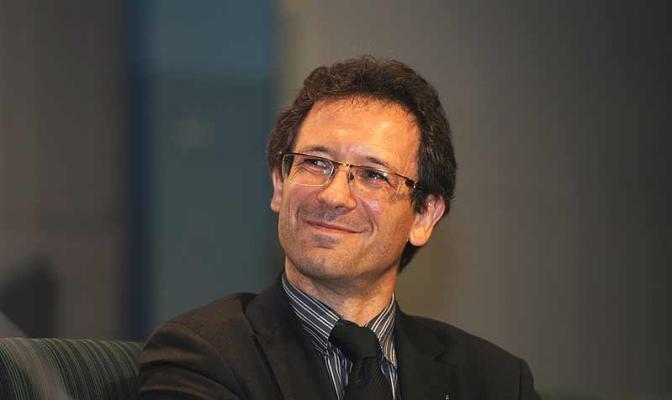
 Christophe Jaffrelot
Christophe Jaffrelot
Christophe Jaffrelot has been awarded the Ramnath Goenka Award for Excellence in the commentary and interpretative category for "incisive writing on India's new political sadhus", which included his articles on Swami Aseemanand and Baba Ramdev, published in the Indian magazine Caravan in 2011.
The seventh edition of the Ramnath Goenka Excellence in Journalism Awards, held in Delhi on 9 September, is the most coveted annual event in the Indian media calendar. The awards, instituted by the Indian Express Group, celebrate excellence in journalism, recognise courage and commitment and showcase outstanding contributions and individuals every year.
Christophe Jaffrelot is CNRS research director at Sciences Po - CERI where he served as director from 2000 to 2008 and teaches South Asian politics and history. Arguably one of the world’s most respected researchers on Indian society and politics, he has published many works, including "The Hindu Nationalist Movement and Indian Politics, 1925 to the 1990s"; "India’s Silent Revolution: The Rise of the Lower Castes in North India"; and "Dr. Ambedkar and Untouchability: Fighting the Indian Caste System".
Sciences Po recruits new academics

 Sciences Po
Sciences Po
Sciences Po recruits a full time tenured professorship specializing in International relations
Deadline for application : 31st October 2014
QS 2019 : Sciences Po, International University

Sciences Po improves once again its global position in "Politics and International Studies", moving up, after three successive years in 4th place, to 3rd position globally in the 2019 QS World Univeristy Rankings by subject, released on 27 February, 2019. Just behind Harvard University and the University of Oxford, Sciences Po is the first university of continental Europe and this discipline.
For the sixth year in a row, the QS rankings by subject, comparing over 1,200 universities, continue to illustrate that Sciences Po is at the heart of leading social science universities. This trend can also be observed in sociology; after being ranked 44th and then 37th in the past two years, Sciences Po has now leaped ahead to the 28th place.
Further progress has also been made in the “Social Policy and Administration” subject, as Sciences Po jumped from 48th to 22nd place in the world rankings.
In law, Sciences Po maintains its place within the 51st and 100th positions. Sciences Po also upholds its rank in economics and history, between the 101st and 150th positions.




